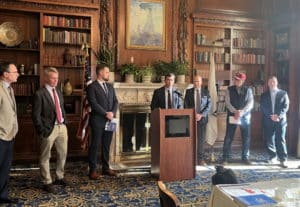
Mass Fiscal Alliance spokesman Paul Craney speaks at a press conference at the Hampshire House on Tuesday with other small government groups from around New England. Photo by Sam Drysdale | State House News Service
Business-minded, small government groups from each New England state think it’s critical to “start working together as a region” to address cost of living issues, high energy prices and economic competitiveness.
The groups met at the Hampshire House in Boston on Tuesday to discuss bringing more natural gas to the Northeast states and relying on nuclear energy, rather than wind and solar renewable alternatives, to prevent energy shortages and bring down home heating costs.
“There might be an environmental left movement out there, but there’s a freedom, pro-energy movement forming here in New England as well,” said Mike Stenhouse, founder and CEO of “free-enterprise public policy think tank” Rhode Island Center for Freedom and Prosperity.
The advocates said the region is suffering from a natural gas shortage partially caused by shutting down nuclear power plants in favor of other renewable forms of energy and limited gas pipelines that serve New England.
“From the moment the first human being stepped foot in New England… one of their top concerns, if not their number one, is how do we survive the winter?” said Drew Cline of the Josiah Bartlett Center for Public Policy. “We have developed the technology to the point that we no longer have to worry about surviving the cold or the extreme heat. We have technology to electrify and heat every home in New England every day. The fact that we’re at risk every single winter of rolling blackouts is not a technological problem, we solved it from a technological standpoint, it is a public policy problem.”
ISO-New England said in December that it does not anticipate calling for controlled power outages this winter and predicts New England should have adequate electricity supplies under mild and moderate weather conditions, while prolonged cold snaps would pose system reliability risks.
Though the winter season has so far been moderate, home heating costs are on the rise in the region and nationally as the price of natural gas has increased worldwide.
Rising costs on power bills have jumped 25 percent in each of the last two years, said Nick Murray of the Maine Policy Institute.
“This is really not sustainable,” he said.
Gov. Maura Healey said at a visit to UMass Dartmouth last week that high energy costs are being driven by the fossil fuel industry, a notion she often cited on the campaign trail when asked about shutting down a pipeline through Western Massachusetts when she was attorney general.
“There’s a reason that people are paying so much in heating bills and electric bills. It’s because we’ve been hostage to the fossil fuel industry for so long,” Healey said at the Dartmouth event.
Lisa Linowes, executive director at WindAction Group, which focuses on policy issues associated with industrial wind development, said the region’s high energy prices could be attributed partially to a move away from nuclear energy towards other renewable sources such as wind and solar.
Linowes, who is also a member of the Save Right Whales Coalition Group, said large offshore wind projects proposed off the coast of Cape Cod would result in “the largest industrialization of our ocean waters.”
“We’re going to lose our beaches, we’re going to lose our views, but even as important we’re going to lose our fishing industry and we’re going to lose critical habitat for the North Atlantic Right Whale, which is a species on the verge of extinction,” Linowes said.
When asked to respond to renewable energy groups who say wind and solar energy are necessary to respond to the climate crisis, Dan Winslow, president of the New England Legal Foundation, said the law cannot keep up with new energy innovations.
“If climate change is an existential threat, then every option, every responsible option should be on the table,” Winslow said.
He said technology out of MIT could remove radioactive elements from nuclear wastewater, allowing the rest to be recycled. This technology, which is not legal in the United States, Winslow said, would remove one of the major drawbacks to nuclear energy.
“That technology exists today, it was invented in Massachusetts,” he said. “The challenge is that the bureaucracy will never keep pace with the innovation of technology, with new change… we have to make sure that we don’t have innovation swallowed by bureaucratic overreach.”
Murray called solar energy “wasteful” and “inefficient” and president of Vermont’s Ethan Allen Institute Rob Roper said wind energy damages environmental ecology while it has “absolutely no impact on climate change.”
Meanwhile, Healey — who has to work toward state targets of reducing greenhouse emissions by 33 percent by 2025, 50 percent by 2030 and 75 percent by 2040 and at least 85 percent by 2050, all compared to the baseline of 1990 emissions — said last week that offshore wind is “an incredibly important industry.”
“This is an opportunity today to grow our own energy source here,” Healey said. “It’s actually going to lower costs for everyone over time. It’s going to improve our health, too, because we also know people may be disproportionately adversely affected by higher rates of pollution and asthma and all sorts of things that are also directly related to climate.”
Talking more generally about cost of living increases and economic competitiveness, leaders of the groups also advocated generally for broad-based tax cuts, including calls from the Massachusetts Fiscal Alliance to eliminate the estate tax and inventory tax completely, and “soften” the corporate tax in the state.
Paul Craney of MassFiscal said the group is prepared to hold Healey accountable on the tax cut promises she made on the campaign trail.
“If Massachusetts wants to improve its competitiveness, it could make capital investments deductible the year that they are expensed,” Craney said.
He referenced the Tax Foundation’s annual business tax climate index, which this year ranked Massachusetts 34th in the nation. Analysts at the foundation said the state’s ranking would slide down to 46th if the voters approved a 4 percent surtax on Bay Staters who make over $1 million a year — which did pass in November.
“Cost of living costs, energy and our competitiveness matter more now than ever,” Craney said. “I’m hoping that this is the start of trying to get the voters to be more focused on these issues that we know they care about.”
Attendees included representatives from the Massachusetts Fiscal Alliance, the New England Legal Foundation, Maine Policy Institute, Ethan Allen Institute in Vermont, Rhode Island Center for Freedom and Prosperity, the Yankee Institute in Connecticut, the Josiah Bartlett Center for Public Policy in New Hampshire, Americans for Prosperity, and WindAction Group.






